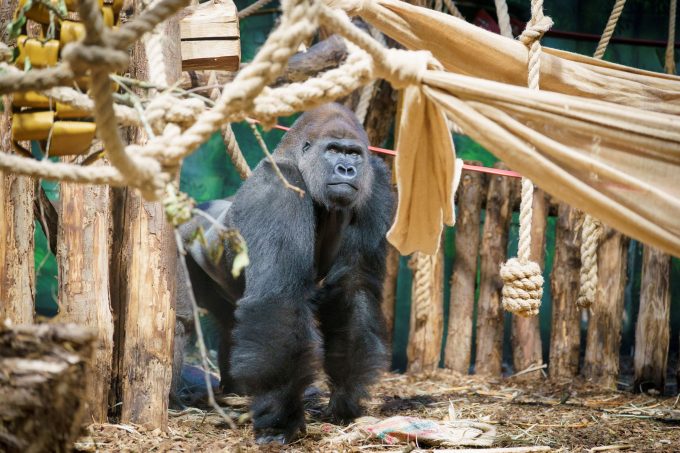DVZ radar: DHL Express awaits the next e-commerce star
It is all about networking

PRESS RELEASE
London/Bonn, November 25, 2022: DHL Express has delivered a Western lowland gorilla named Kiburi to ZSL London Zoo as part of an international breeding program for the Critically Endangered species.
18-year-old Kiburi who travelled from Zoo Loro Parque in Tenerife, was given the VIP treatment for the 1,903 mile door-to-door journey – travelling in a custom-built crate supported by a dedicated team of zookeepers, aircraft engineers, cargo handlers, security teams, pilots and drivers. The 193kg and 5ft 4ft tall silverback enjoyed an in-flight meal of nutritious leafy greens, snacked on leeks and a banana and had a refreshing drink of cold fruit tea during his first-class trip.
Arriving in London late on Friday, November 18, Kiburi slept over at Heathrow Airport before arriving at the Zoo at 8am the following morning. A team of vets and zookeepers at London Zoo were on hand to receive the special delivery, and after giving Kiburi a check-up, introduced him to his new Gorilla Kingdom home.
Roy Hughes, EVP Network Operations & Aviation Europe at DHL Express, said: “Helping Kiburi move to London has been a huge privilege. The logistics effort behind transporting him was no mean feat but our team of experts, working closely with ZSL London Zoo and Loro Parque, went to every length to ensure his journey was safe and comfortable. Everyone at DHL is very invested in this conservation move, and we look forward to seeing Kiburi enjoying his new Gorilla Kingdom home.”
Kiburi will lead the world-famous zoo’s current troop, females Mjukuu and Effie, and youngsters Alika and Gernot, in the family’s Gorilla Kingdom home – with hopes that the match-making effort will lead to a further increase to the gorilla population.
The exciting move was four years in the making: following the sad passing of London Zoo’s male Kumbuka in 2018, ZSL London Zoo began the search for the perfect male to take his place, working with the European Endangered Species Breeding Program (EEP) coordinator for Western lowland gorillas, which holds detailed records on each gorilla in the program.
Kiburi will spend the next few weeks exploring the rest of his new Gorilla Kingdom home – which includes a lush private island, complete with hidden caves, giant jungle gym and a flowing stream – and slowly being introduced to his new troop, in time for their first family Christmas.
Glynn Hennessy, Gorilla Keeper, ZSL London Zoo, said: “We’re so pleased Kiburi has joined us here at London Zoo, and are grateful to DHL for the first class care they gave our oversized package throughout this carefully planned delivery. Like any blended family, when getting to know each other it’s important to take thing slowly, so we’ll be keeping a close eye on the troop and introducing them to each other face-to-face at a pace that they’re comfortable with.”
ZSL London Zoo’s Zoological Operations Manager Dan Simmonds, who oversaw the move, added: “Western lowland gorillas are sadly declining in the wilds of central and western Africa and face threats from poaching, disease, deforestation and climate change. ZSL is working to protect the species at ZSL London Zoo by taking part in this vital global breeding program, while investigating wildlife diseases at ZSL’s world-leading Institute of Zoology, working with partners in the field to strengthen wildlife protection and surveillance, and empowering local communities to combat wildlife crime. In time we hope to hear the pitter patter of tiny gorilla feet once again in Gorilla Kingdom – adding to the dwindling population numbers of this Critically Endangered species.”
Comment on this article